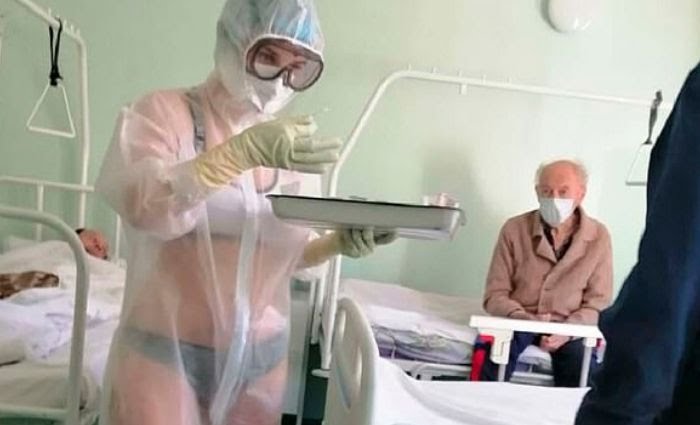Newly announced limits on visas for foreign nurses threatens to further a staffing strain on hospitals, nursing homes and other major health employers.
The State Department in its May Visa Bulletin announced that nearly all the available green card slots that nurses are eligible for had been filled. Only people who applied prior to June 1, 2022 will be eligible to continue with visa interviews, even if an applicant already had a job offer in the U.S.
Those with more recent applications will have to go back in line when the quota resets in October at the start of the next fiscal year, resulting in a backlog and further delaying the entrance of new nurses into the workforce.
The U.S. is facing a major nursing shortage amid unprecedented burnout and an aging workforce, and federal estimates show the country will need about 200,000 more nurses every year through at least 2030 to fill the gaps.
“Prior to COVID we had a nursing shortage. During COVID, it’s estimated that we lost about 100,000 nurses,” said Patty Jeffrey, a registered nurse and president of the American Association of International Healthcare Recruitment.
“If we don’t have a steady flow of these international nurses to enter the country and provide services, this is dire for our hospitals, who have become more dependent on this workforce,” Jeffrey said.
Foreign nurses comprise about 15 percent of the nursing workforce. They are eligible to enter the country with an EB-3 visa, a permanent residency green card that includes all occupations which require at least an associate’s degree but not a master’s degree.
But the immigration quota hasn’t changed since 1990. The State Department limits the total number of EB-3 visas to just 28.6 percent of all employment-based visas, about 40,000 each fiscal year.
Even though nurses are considered essential health workers, they are generally not in the same category as physicians and even some IT workers, and they are competing for slots against both skilled and unskilled workers.
According to the State Department, an immigrant visa must be available to the applicant both at the time of filing and at the time a decision is made on the application.
The monthly Visa Bulletin lists the cut-off dates, and lets applicants know when they are eligible to be granted permanent resident status. Applicants who have a priority date—the date the green card petition is first officially filed — earlier than the cut-off date are eligible to apply for permanent residence.
When more people apply for a visa in a particular category or country than there are visas available, the eligibility date retrogresses, or moves backwards.
Chris Musillo, an immigration attorney and managing partner at Musillo Unkenholt, said anyone with an interview this month will still be able to enter the country either late this year, or more likely the first part of 2024.
But as of May 1, anyone with a pending interview will have to wait until Oct. 1, when the quotas will likely reset. That creates a backlog, Musillo said.
Musillo said he’s telling hospitals that even if they have a qualified nurse candidate they want to sponsor and start the process today, the nurse won’t be allowed into the country until late 2024 or “more realistically, 2025.”
Most of the nurses that are being affected by the retrogression filed their green cards within the past 9 to 12 months, with an expectation that they’d come to the U.S. and start working in 2023. But now, they won’t get an interview and are stuck waiting overseas.
“This is a multi-year process to get people there, our hospitals were depending on [these individuals], and now because of the retrogression they won’t receive them,” said Jeffrey.
But it’s also not just hospitals that are being impacted.
“To freeze the ability for foreign-born nurses to immigrate to the U.S. using the EB-3 visa eliminates a valuable option for bringing more qualified workers into the aging services sector,” said Ruth Katz, senior vice president of policy at LeadingAge, the association of nonprofit aging services providers.
“This visa retrogression shuts off one meaningful workforce solution, and, ultimately, harms older adults and families who cannot access needed care and services. Without staff, there is no care,” Katz said.
During the height of the COVID-19 pandemic, more nurses were able to enter the country because other family visas were going unused, and were able to be rolled over into employment-based visas.
In FY 2022, the rollover of family visas doubled the number of available employment-based slots.
But with the pandemic waning, family visas are increasing again, and the EB-3 cap was reached quickly.
Health groups and immigration advocates are pressing for Congress to fix the problem by recapturing unused immigrant visas and giving them to nurses and physicians. But immigration politics are making passing any kind of fix difficult.
Musillo and Jeffrey said they thought Congress found a bipartisan solution last year with the Healthcare Workforce Resilience Act, but it never made it out of the Senate Judiciary Committee.
“This is a health care problem, but unfortunately the solution is an immigration solution,” Jeffrey said.

 thehill.com
thehill.com
The State Department in its May Visa Bulletin announced that nearly all the available green card slots that nurses are eligible for had been filled. Only people who applied prior to June 1, 2022 will be eligible to continue with visa interviews, even if an applicant already had a job offer in the U.S.
Those with more recent applications will have to go back in line when the quota resets in October at the start of the next fiscal year, resulting in a backlog and further delaying the entrance of new nurses into the workforce.
The U.S. is facing a major nursing shortage amid unprecedented burnout and an aging workforce, and federal estimates show the country will need about 200,000 more nurses every year through at least 2030 to fill the gaps.
“Prior to COVID we had a nursing shortage. During COVID, it’s estimated that we lost about 100,000 nurses,” said Patty Jeffrey, a registered nurse and president of the American Association of International Healthcare Recruitment.
“If we don’t have a steady flow of these international nurses to enter the country and provide services, this is dire for our hospitals, who have become more dependent on this workforce,” Jeffrey said.
Foreign nurses comprise about 15 percent of the nursing workforce. They are eligible to enter the country with an EB-3 visa, a permanent residency green card that includes all occupations which require at least an associate’s degree but not a master’s degree.
But the immigration quota hasn’t changed since 1990. The State Department limits the total number of EB-3 visas to just 28.6 percent of all employment-based visas, about 40,000 each fiscal year.
Even though nurses are considered essential health workers, they are generally not in the same category as physicians and even some IT workers, and they are competing for slots against both skilled and unskilled workers.
According to the State Department, an immigrant visa must be available to the applicant both at the time of filing and at the time a decision is made on the application.
The monthly Visa Bulletin lists the cut-off dates, and lets applicants know when they are eligible to be granted permanent resident status. Applicants who have a priority date—the date the green card petition is first officially filed — earlier than the cut-off date are eligible to apply for permanent residence.
When more people apply for a visa in a particular category or country than there are visas available, the eligibility date retrogresses, or moves backwards.
Chris Musillo, an immigration attorney and managing partner at Musillo Unkenholt, said anyone with an interview this month will still be able to enter the country either late this year, or more likely the first part of 2024.
But as of May 1, anyone with a pending interview will have to wait until Oct. 1, when the quotas will likely reset. That creates a backlog, Musillo said.
Musillo said he’s telling hospitals that even if they have a qualified nurse candidate they want to sponsor and start the process today, the nurse won’t be allowed into the country until late 2024 or “more realistically, 2025.”
Most of the nurses that are being affected by the retrogression filed their green cards within the past 9 to 12 months, with an expectation that they’d come to the U.S. and start working in 2023. But now, they won’t get an interview and are stuck waiting overseas.
“This is a multi-year process to get people there, our hospitals were depending on [these individuals], and now because of the retrogression they won’t receive them,” said Jeffrey.
But it’s also not just hospitals that are being impacted.
“To freeze the ability for foreign-born nurses to immigrate to the U.S. using the EB-3 visa eliminates a valuable option for bringing more qualified workers into the aging services sector,” said Ruth Katz, senior vice president of policy at LeadingAge, the association of nonprofit aging services providers.
“This visa retrogression shuts off one meaningful workforce solution, and, ultimately, harms older adults and families who cannot access needed care and services. Without staff, there is no care,” Katz said.
During the height of the COVID-19 pandemic, more nurses were able to enter the country because other family visas were going unused, and were able to be rolled over into employment-based visas.
In FY 2022, the rollover of family visas doubled the number of available employment-based slots.
But with the pandemic waning, family visas are increasing again, and the EB-3 cap was reached quickly.
Health groups and immigration advocates are pressing for Congress to fix the problem by recapturing unused immigrant visas and giving them to nurses and physicians. But immigration politics are making passing any kind of fix difficult.
Musillo and Jeffrey said they thought Congress found a bipartisan solution last year with the Healthcare Workforce Resilience Act, but it never made it out of the Senate Judiciary Committee.
“This is a health care problem, but unfortunately the solution is an immigration solution,” Jeffrey said.

Health groups sound the alarm over foreign nurse visa freeze
Newly announced limits on visas for foreign nurses threatens to further a staffing strain on hospitals, nursing homes and other major health employers. The State Department in its May Visa Bulletin…


